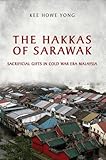The Hakkas of Sarawak : Sacrificial Gifts in Cold War Era Malaysia / Kee Howe Yong.
Material type: TextSeries: Anthropological HorizonsPublisher: Toronto : University of Toronto Press, [2013]Copyright date: ©2013Description: 1 online resource (240 p.)Content type:
TextSeries: Anthropological HorizonsPublisher: Toronto : University of Toronto Press, [2013]Copyright date: ©2013Description: 1 online resource (240 p.)Content type: - 9781442615465
- 9781442667976
- 959.5/4004951 23
- online - DeGruyter
| Item type | Current library | Call number | URL | Status | Notes | Barcode | |
|---|---|---|---|---|---|---|---|
 eBook
eBook
|
Biblioteca "Angelicum" Pont. Univ. S.Tommaso d'Aquino Nuvola online | online - DeGruyter (Browse shelf(Opens below)) | Online access | Not for loan (Accesso limitato) | Accesso per gli utenti autorizzati / Access for authorized users | (dgr)9781442667976 |
restricted access online access with authorization star
http://purl.org/coar/access_right/c_16ec
This book tells the story of the Hakka Chinese in Sarawak, Malaysia, who were targeted as communists or communist sympathizers because of their Chinese ethnicity the 1960s and 1970s. Thousands of these rural Hakkas were relocated into "new villages" surrounded by barbed wire or detained at correction centres, where incarcerated people were understood to be "sacrificial gifts" to the war on communism and to the rule of Malaysia's judicial-administrative regime.The Hakkas of Sarawak looks at how these incarcerated people struggled for survival and dealt with their defeat over the course of a generation. Using methodologies of narrative theory and exchange theory, Kee Howe Yong provides a powerful account of the ongoing legacies of Cold War oppression and its impact on the lives of people who were victimized by these policies.
Mode of access: Internet via World Wide Web.
In English.
Description based on online resource; title from PDF title page (publisher's Web site, viewed 01. Nov 2023)


